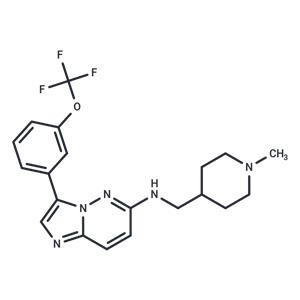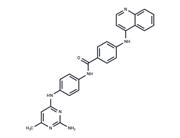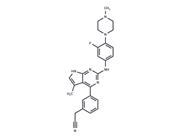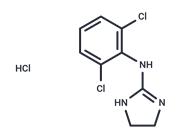| Name | SGI-1776 |
| Description | SGI-1776 (Pim-Kinase Inhibitor IX) has been used in trials studying the treatment of Prostate Cancer, Non-Hodgkins Lymphoma, and Relapsed/Refractory Leukemias. |
| Cell Research | Cells are cultured in IMDM (ATCC) supplemented with 10% FBS and grown in a 37oC incubator with 5% CO2. Cells are routinely tested for Mycoplasma infection using a commercially available kit. Cells are treated with DMSO or various concentrations of SGI-1776 for 24 hours. Cells (1×106) are washed, then resuspended in 100 μL of annexin binding buffer, mixed with 5 μL of FITC solution and 5 μL of propidium iodide (PI; 50 μg/mL) solution. For each sample, 1×104 cells are measured using a Becton Dickinson FACSCalibur flow cytometer. (Only for Reference) |
| Kinase Assay | Kinase Assays: Kinase inhibition is measured by the use of radiometric assays performed by KinaseProfiler service. Assays contain a peptide substrate, known purified recombinant human kinases, gamma-labeled ATP, magnesium ion, and a fixed concentration (1 μM) of SGI-1776. In a final reaction volume of 25 μL, 5 to 10 mU of Pim1/2/3 is incubated with 8 mM of MOPS, pH 7.0; 0.2 mM ethylene diamine tetraacetic acid; 100 μM KKRNRTLTV;10 mM MgAcetate; and [γ-32P-ATP] . The reaction is initiated by the addition of the MgATP mix. After incubation for 40 minutes at room temperature, the reaction is stopped by the addition of 5 μL of a 3% phosphoric acid solution. Then, 10 μL of the reaction is spotted onto a P30 filtermat and washed 3 times for 5 minutes in 75 mM phosphoric acid and once in methanol before it is dried and measured via a scintillation counter. |
| In vitro | SGI-1776 has demonstrated preclinical activity against leukemia and solid tumor cell line models, with IC50 values ranging from 0.005 to 11.68 mM. It induced a significant difference in the distribution of in vivo EFS (event-free survival) in 9 out of 31 solid tumor xenografts and in 1 out of 8 evaluable ALL (acute lymphoblastic leukemia) xenografts. Furthermore, SGI-1776 has proven effective in mouse models harboring the MV-4-11 tumor. |
| In vivo | SGI-1776 induces dose-dependent apoptosis in CLL cells through a mechanism that involves a decrease in Mcl-1. Additionally, in vitro, SGI-1776 demonstrates cytotoxicity with an average relative IC50 value of 3.1 mM. Beyond targeting Pim, SGI-1776 effectively targets FLT3 with an IC50 of 44 nM. It also induces apoptosis in AML cells in a concentration-dependent manner and shows cytotoxic effects on primary AML cells, leading to a reduction in Mcl-1 protein. |
| Storage | Powder: -20°C for 3 years | In solvent: -80°C for 1 year | Shipping with blue ice. |
| Solubility Information | DMSO : 55.55 mg/ml (137.03 mM), Sonication is recommended.
Ethanol : 75 mg/mL (185 mM)
|
| Keywords | SGI-1776 | Pim | Inhibitor | SGI 1776 | Pim kinases | SGI1776 | inhibit | Apoptosis | Autophagy |
| Inhibitors Related | Stavudine | 5-Fluorouracil | Sodium 4-phenylbutyrate | L-Ascorbic acid | Hydroxychloroquine | Guanidine hydrochloride | Taurine | Tributyrin | Curcumin | Paeonol | Naringin | Gefitinib |
| Related Compound Libraries | Bioactive Compound Library | Kinase Inhibitor Library | Tyrosine Kinase Inhibitor Library | Anti-Cancer Clinical Compound Library | Drug Repurposing Compound Library | Inhibitor Library | Anti-Aging Compound Library | Bioactive Compounds Library Max | Anti-Cancer Drug Library | Anti-Cancer Active Compound Library |

 United States
United States



